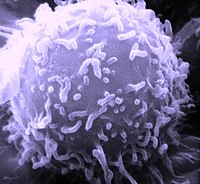
Photo from wikipedia
The fetal immune system is distinguishable from the adult immune system by a higher degree of tolerance to foreign antigens. This tolerance is important for fetal development within the ‘foreign’… Click to show full abstract
The fetal immune system is distinguishable from the adult immune system by a higher degree of tolerance to foreign antigens. This tolerance is important for fetal development within the ‘foreign’ maternal environment, and during birth when barrier surfaces are first colonized by microbiota. Immune responses against the wave of newly colonizing microbiota would cause massive damage to barrier tissues, so neonates need suppressed immune responses and instead rely on maternal antibodies for protection. It is becoming clear that the early‐life establishment of tolerance could impact immune homeostasis and predisposition to autoimmune diseases throughout life. However, it is not well understood how and when perinatal tolerogenic immune responses switch towards adult‐like effector immune responses. Here, we present a new report on the differences between cells from perinatal umbilical cord blood (UCB) and adult peripheral blood mononuclear cells (PBMC), which give mechanistic insights into fetal tolerogenic responses.
Journal Title: Immunology
Year Published: 2021
Link to full text (if available)
Share on Social Media: Sign Up to like & get
recommendations!